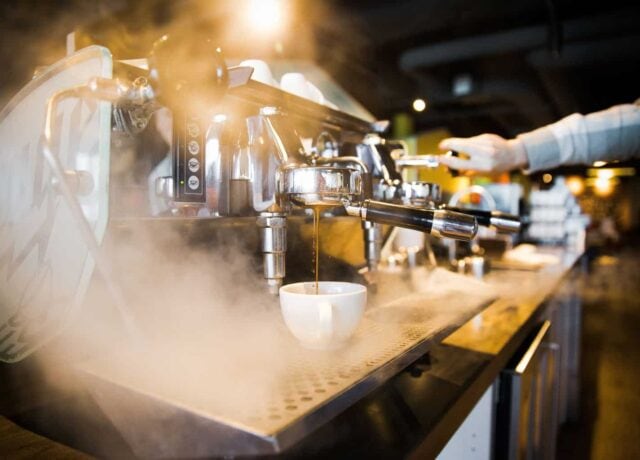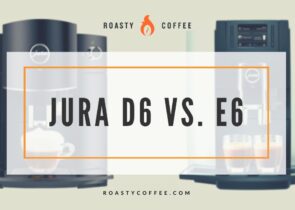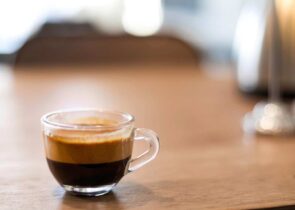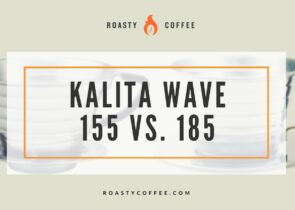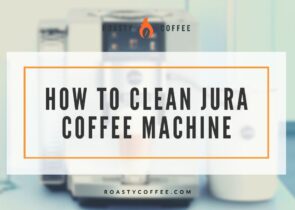Whether you’re just starting out or you’re trying to grow an already established business, choosing the right espresso machine for your shop is vital.
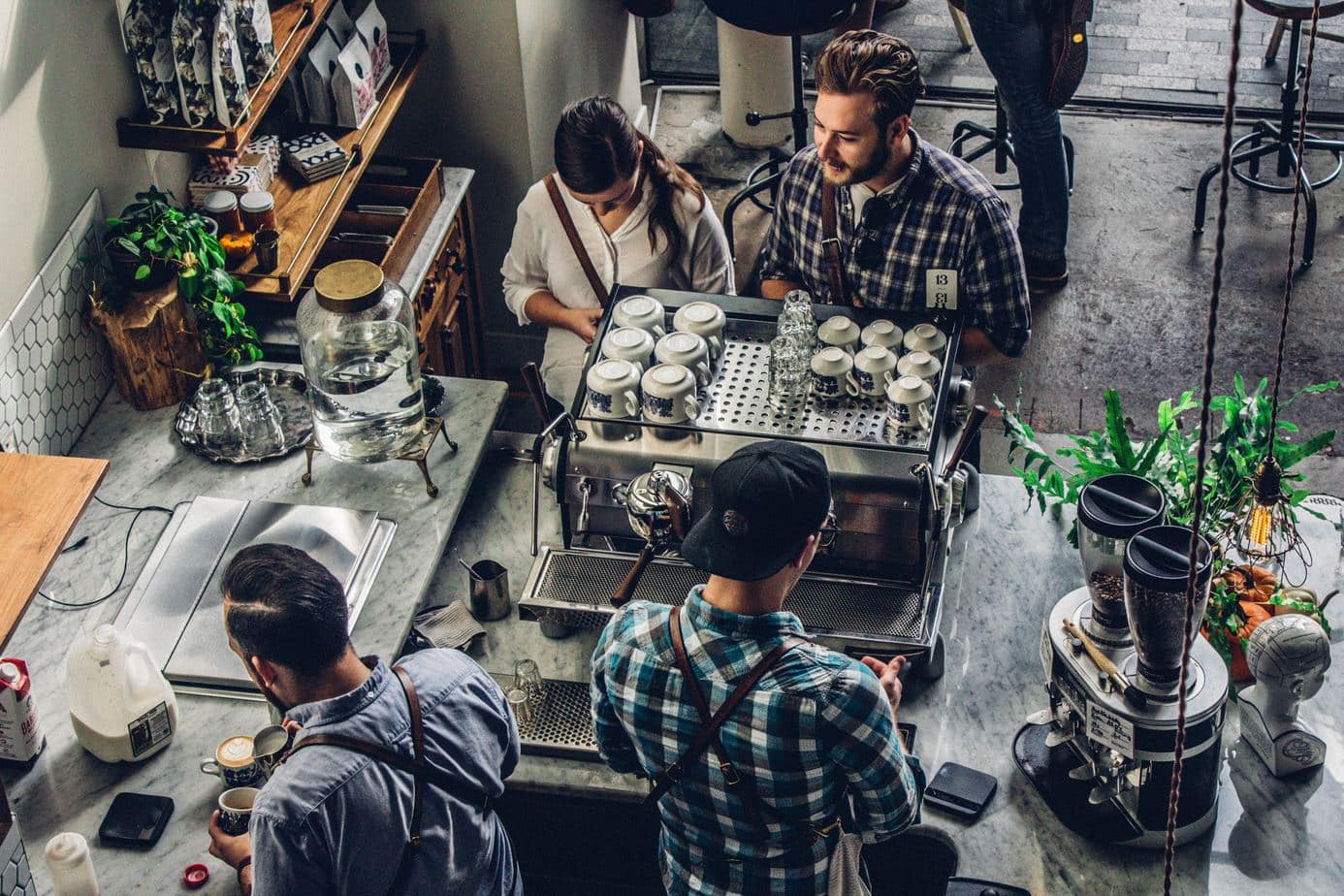
At A Glance: Our Top 5 Picks for Commercial Espresso Machines
Quick Summary: The Best Commercial Espresso Machine
 | Our Top Pick La Pavoni Bar T 2 Group |
| Check on Amazon → |
 | Nuova Simonelli Aurelia II |
| Check on Amazon → |
 | Nuova Simonelli Appia II |
| Check on Amazon → |
 | Bezzera Magica E61 |
| Check on Amazon → |
 | Breville Barista Express Espresso |
| Check on Amazon → |
 | Sixties Deliziosa Commercial Espresso Machine |
| Check on Amazon → |
So if you’re trying to take your coffee shop’s brewing to the next level, read on for some reviews of the best commercial espresso machines.
A Preface
Coffee culture became big in Europe by the 19th century. As a result, inventors, especially in Italy, strove to innovate the machinery associated with the craft.
Angelo Moriondo is the man credited with creating the original espresso machine. He used a winning combination of steam, high pressure, and tightly packed grounds to create the foundation for the modern espresso machine.
After Moriondo, the modernization continued with Luigi Bezzera and Desiderio Pavoni. Finally, Achille Gaggia invented the spring piston lever, which introduced the world of semi-automatic machines and crema.
As innovations progressed, espresso culture did as well. Cafés became popular, the craze spread to the West, and baristas strove to perfect their craft.
Best Commercial Espresso Machines
La Pavoni Bar T 2 Group
La Pavoni has been around since 1905. In the last hundred or so years, they’ve become one of the biggest names in the business, and it’s not hard to see why.
The Bar T 2 is the Mario of commercial espresso machines- good specs all around. With a 14L boiler capacity and the capability to produce 600 cups of espresso per day, this machine is perfect for most coffee shops.
Additionally, both durable, brass-chrome group heads have radiator hydraulic systems. Plus, there’s a pre-infusion function (aka soft-infusion system) for optimal shot pulling. Other notable features include:
- Built-in steam wands (helps cut down on the amount you’re investing)
- Adjustable cup size (four different options)
- Boiler Auto Fill System
- Multiple, independent solenoids (coils) (allow for simultaneous brewing of separate drinks)
- Flexible hot water jet
- Waterline connectivity
- Measures 28in x 20in x 21in and weighs 130 lbs
If you’re just looking for a quick recommendation, stop at this machine. It’s our overall top pick.
If you prefer a manual machine, the more expensive La Pavoni Bar 3L-B might be something worth splurging on.
Nuova Simonelli Aurelia II
This Aurelia II is a volumetric two-group espresso machine. So, it can do double duty for your shop with a two-group head and two steam wands. If you’re ready to make a serious, hefty investment that is going to take your blossoming shop to the next level, this might be the espresso machine for you.
The Nuova Simonelli Aurelia II comes decked out with manual and programmable dosing, which will ensure consistent, high-quality shot pulling. To further this effort, this Simonelli espresso machine also has a pre-infusion or soft infusion system, which allows for more flexibility in tamping. Overall, this infusion system plus the ergonomic design of the machine makes it fairly user-friendly, especially for a high=end commercial espresso machine.
This product is truly a commercial espresso machine too, able to handle high turn-overs with ease. It even allows you to attach an additional steam wand on each side if necessary. So it is likely best for coffee shops with a considerable clientele contending with some serious rush times.
Additionally, the Aurelia II also has a digital, 4-group option that might be worth the investment for especially high- volume shops.
Nuova Simonelli Appia II
If you want something a little simpler than the Aurelia or with two spouts instead of one, opt for the Appia.
With the capability to brew between 30 and 100 drinks per hour, the Appia II works well in a medium-capacity coffee shop. The perfect mid-range machine, the second Appia is one of Nuova Simonelli’s best selling models.
It uses volumetric monitoring to stop shot pulling at the exact right time. Even before your shot is pulled, the Appia II uses a pre-infusion function to make sure you get the most from your grounds.
Other features we should mention are the:
- Respectably sized 11-liter boiler
- Stainless steel build materials and ABS construction
- 2 brew groups with raised group heads
- Soft Infusion System (SIS) that ensures professional quality shot pulling and brewing
Bezzera Magica E61
Produced by one of the first companies to manufacture super automatic espresso machines, the E61 is a top-notch, classic commercial machine.
This machine is a beautiful blend of time-tested usability and forward-thinking innovation. The E61 group head is often referred to as the industry’s “gold standard.” Also, the joystick-style lever is ergonomic and fun to use.
Plus, this model includes:
- Steam and hot water wands
- A vibratory pump with 15 BAR pressure that improves shot flavor
- Automatic water refill function
Additionally, the heat exchanger and dual boiler allow for quick a heat-up and cycle as well as simultaneous shot pulling and milk frothing. So while it’s a little on the small side, you can still get a lot out of this machine.
The Bezzera Magica is best for smaller cafe’s, but it’ll reliably produce excellent espresso and espresso-based drinks for years.
Breville Barista Express
The price tags that come with most true commercial coffee machines can be a bit off-putting for small coffee shops or cafes with a broader focus than just espresso. If that sounds like you, we recommend checking out the Barista Express.
The Breville Barista Express is one of the best espresso machines we’ve come across, but it is usually intended to serve as a home espresso machine for caffeine enthusiasts. However, we believe its high-end features also make it a good choice for small-scale gigs that want to offer quality espresso but don’t have the same capacity needs and budgetary leeway as larger establishments.
Some notable features of the Barista Express:
- Bean-to-cup and dose control: This machine features a 1/2 lb bean hopper with an integrated conical burr grinder.
- PID extraction mechanism: The digital temperature control allows for precise espresso extraction by maintaining accurate control over the boiler and hot water output.
- Flexibility: You can pull both single and double shots, adjust the grind size and amount, initiate a manual override, and hand texture microfoam with the steam wand.
- Durable, stainless steel build: Even though this machine is much cheaper than other ones listed here, it is definitely still built to last the test of time.
- Large Reservoir: The 67 oz water reservoir is definitely one of the pros for this machine; while other types of water systems are better for high volume shops, this is perfectly fine for a low volume space.
No major expertise is required with this machine, but those who have some won’t feel like they’re compromising. You can choose between the functionality of an automatic espresso machine and a more semi-automatic style. Overall, the Breville Barista Express is one of the best commercial espresso machines out there for small coffee shops.
Elektra Sixties Deliziosa
If you are interested in the small footprint of the Breville machine but need something a little less domestic, check out the Sixties Deliziosa. While this is still technically a “domestic” machine the direct water line hook-up and stepped-up features make it a great in-between option. Elektra markets the machine as the best choice for “ice cream shops, bars and small cafés.”
In addition to having a bit more professional feel to it, Elektra’s Sixties Deliziosa has some seriously sweet features. Here are a few of them:
- Controls: This machine features a sleek push-button to select coffee dispensing settings.
- Customizability: The Deliziosa provides electronic control of the boiler heating function/water temperature and precise electronic adjustment of the brewing temperature; plus, you can customize the machine to include a second steamer if you so choose.
- Energy-saving: There is a programmable night cycle that reduces energy consumption to help you save money
- Stainless steel, anti-twist build: The metal body, Steam/hot water tap with pivoting lever control, and jointed wands are all impressively durable.
If you are looking for a compact yet professional machine to add to your arsenal, the Sixties Deliziosa might be the best commercial espresso machine for you!
Before you buy…
Selecting a machine to suit a commercial setting can be a big deal, so make sure you’ve thought through all the factors before making your choice.
Below are some of the main things you need to consider before taking the plunge.
Volume
You need to consider volume in two senses.
First, the volume of your establishment. How many people do you typically serve per day? What does rush hour look like?
For reference, a two-group head machine can typically manage roughly 125 shots per hour (about 1000 in a day if your shop is open 8 full hours). If you are seeing more customers than that and you invest in the wrong machine, you may have to purchase a second one, which is not ideal. You would be better off investing in a 3 or 4 group head heavy-duty commercial espresso machine.
Alternatively, if you see vastly less than 1000 customers a day, single group head machine may work just fine for your needs, Whatever your customer traffic, you need a machine that can keep up with your needs. Which brings us to the other kind of volume: water.
If your espresso machine doesn’t have a direct water line, you’ll need to consider how many shots it can pull before needing to be refilled. A smaller tank won’t bother a smaller shop, but it could quickly become a pain for a larger one. In general, direct lines are preferable in commercial environments, unless your shop is particularly small or mobile.
Versatility
What all can the machine DO? Some machines can just pull a shot and still require a little assistance to do that. Others are decked out in features like auto-frothing, hot water spouts, etc.
You want to make sure you get a machine that is versatile and easily customizable. A good way to check versatility is to see if it has presets and if you can alter them with ease. Also, look to see if you can change the temperature and volumetric controls.
Also, take note of how straightforward these customizations are to manipulate. If you are training a relatively green barista, will they be able to effectively utilize these features? You would not want to have to repair your espresso machine just because the manufacturer made it unreasonably difficult to alter a few settings.
Automation
Speaking of versatility, you’ll need to consider whether to get a manual, semi-automatic, or a fully/super-automatic machine.
Manual lever espresso machines aren’t particularly common outside of very niche hipster coffee shops. They require strong, experienced baristas and patient customers. Generally, these aren’t the best commercial espresso machines for most coffee shops.
Semi-automatics give you control over the brewing process while also greatly improving the ease of use of the espresso machine. Plus, they still allow your barista to demonstrate his or her skills. However, if you or your employee(s) are very inexperienced, a semi-automatic can be challenging to learn.
On the other hand, fully automatic machines and super-automatic machines might be harder to customize. But, they should be easier to learn and they will probably make things a lot more convenient. These are the best options for a coffee shop that really needs something simple and efficient to get the job done.
You should also consider the general vibe of your establishment here. If you have a pretty low-key, laid-back shop with experienced staff, a semi-automatic or even manual machine might be a nice touch. However, regardless of staff experience, a more automized and user-friendly commercial espresso machine is likely the best option for high-volume shops.
Budget
This might seem like a no-brainer, but it is something you should probably slow down and really think about. These machines all come with varying levels of kit attached, alongside vastly different price tags. You do not want to overinvest in a machine whose functionalities you will hardly use just because it had “all the bells and whistles.”
On the other hand, you don’t want to buy a machine that does not meet your needs and end up blowing extra cash on additional accessories you didn’t realize you needed.
Here are some things to consider: Does the machine have a built-in frother or a steam wand? How good is it if the machine has one?
The reality is that sometimes you may need to purchase extra equipment to complete your arsenal. But it is best to try to get a machine that meets your needs as closely as possible in order to get the most bang for your buck.
Thus, you should check what a machine offers against everything you need to see if there are any gaps you’ll need to cover separately.
Grinder
It may seem odd to bring grinders into an espresso machine discussion. But your grinder is actually an important factor to consider when selecting which machine is best for your business. Your grinder needs to have the equivalent cup-per-hour grinding capacity as your espresso machine’s brewing capacity.
Don’t blow your budget on a machine that brews 125 shots/hour when you can only grind enough for 50. If your grinder isn’t meeting your needs in terms of volume, make sure you budget in a new one that can keep up with your machine of choice.
For more information on how to choose a grinder for your coffee shop, check out our favorites here.
About the Brands
La Pavoni
La Pavoni, founded in 1905, is an Italian manufacturer of both domestic and commercial products. This brand developed right alongside the Bezzera brand and the two are known for being two of the first names in commercial espresso.
Additionally, La Pavoni is widely known for incorporating classic designs with high quality builds to produce unique, durable machines.
Nuova Simonelli
A dominating force in both accessible and luxury products (since the absorption of Victoria Arduino), Nuova Simonellihas been a leading brand in commercial espresso machines since 1936.
Their products are commercial grade and lend themselves well to coffee shops and home use.
Bezzera
You might recognize this name as that of one of the first to have an espresso machine patent. Bezzera was founded in 1901 and theirs has been one of the leading names in the game since they basically began the game.
They produce both professional and semi-professional machines. And their main focus is on the research and development of new innovations for their products.
Elektra
This Italian manufacturing company was founded in 1947 and puts its focus on the artistic side of espresso brewing. They are one of the few companies that have refused to produce any automatic machines, specializing exclusively in manual and semi-automatics.
Common Questions
What makes commercial machines different from domestic ones?
Of course, there are variations that depend on brand and build quality. Nonetheless, there are a couple of consistent differences between commercial and domestic machines.
First, commercial machines can generally handle higher volume environments. The number of drinks that can be brewed per day and the speed at which those shots are pulled consecutively tends to be higher for commercial machines.
Second, the level of programmability for commercial machines, regardless of their automation level. Thus, commercial machines can make more precisely tuned specialty drinks (that is, of course, if the barista knows how to adjust these settings).
Lastly, commercial machines are generally much larger and heavier than domestic machines. Some domestic machines (like the Breville Barista Express) may be able to handle low-volume shops. However, chances are most commercial machines wouldn’t work well on your countertop.
These extra features also account for the higher cost of these machines.
What machines does Starbucks use?
The famous coffee giant gets its espresso machines from a Swiss company called Thermoplan. The model is called the Mastrena High-Performance Espresso Machine. It’s a fully automatic bean to cup machine.
They opted for this capability above manual or semi-automatics to streamline their service. However, they still have baristas who can program and interact with the machinery to give customers the café experience.
Unfortunately, Thermoplan works exclusively with Starbucks, so other companies are unable to get the same machines. On the bright side, other high-end fully automatic espresso machines listed above can achieve similar results.
How long does a commercial espresso machine last?
Obviously, the longevity of your espresso machine will directly relate to the quality of its maintenance. A poorly maintained machine that is pulling 100+ espresso shots every day may not even last a year. But if you are taking proper care of your machine (cleaning and descaling regularly, using quality beans, etc.) it can last anywhere from 5 to 15 years.
If you want to get the most out of your espresso machine, expect to clean it every single day. That’s alongside frequent descaling as well as other regular maintenance and best practices. This definitely is not an area you’ll want to slack off in! You want to make sure the machine eventually pays for itself before you have to replace it.
How much does a commercial espresso machine cost?
Honestly, the answer is “it depends.” Machines in this category can come in anywhere from $5,000 to $40,000, depending on things like the number of boilers, group heads, steam wands, level of automation, built-ins, etc. The number of customers you are serving and the type of ambiance you are trying to create along with a slew of other factors will impact how much money you are looking at spending.
With all of that said, the list we’ve curated focuses mostly on available machines that boast a great performance without creeping into the upper price range. Unless your needs demand that you get an absolutely massive machine with every bell whistle and group head around, chances are you will be able to find something below $15,000.
Wrap-up
A cafe is a cafe, no matter how small. So, regardless of what your establishment looks like, you should be able to find the perfect machine for you.
Happy Caffeinating!








